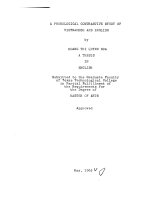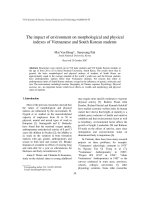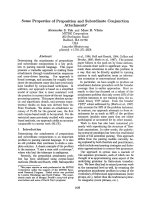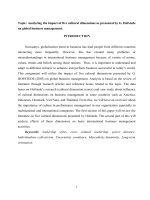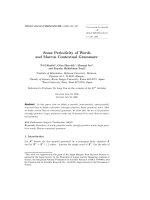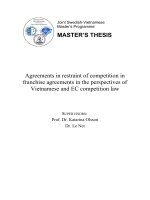some reflections of vietnamese and american cultural values on vietnamese-american business negotiation = các giá trị văn hóa việt nam, hoa kỳ phản ánh trong đàm phán thương mại việt-mỹ
Bạn đang xem bản rút gọn của tài liệu. Xem và tải ngay bản đầy đủ của tài liệu tại đây (553.79 KB, 14 trang )
VIETNAM NATIONAL UNIVERSITY, HA NOI
UNIVERSITY OF LANGUAGES AND INTERNATIONAL STUDIES
FACULTY OF POST-GRADUATE STUDIES
--------------- ---------------
LÊ THỊ VÂN NGA
SOME REFLECTIONS OF VIETNAMESE AND AMERICAN
CULTURAL VALUES ON VIETNAMESE-AMERICAN BUSINESS
NEGOTIATION
(CÁC GIÁ TRỊ VĂN HÓA VIỆT NAM, HOA KỲ PHẢN ẢNH TRONG
ĐÀM PHÁN THƯƠNG MẠI VIỆT – MỸ)
M.A. MINOR THESIS
Field: English Linguistics
Code: 60.22.15
Hanoi, 2011
VIETNAM NATIONAL UNIVERSITY, HA NOI
UNIVERSITY OF LANGUAGES AND INTERNATIONAL STUDIES
FACULTY OF POST-GRADUATE STUDIES
--------------- ---------------
LÊ THỊ VÂN NGA
SOME REFLECTIONS OF VIETNAMESE AND AMERICAN
CULTURAL VALUES ON VIETNAMESE-AMERICAN BUSINESS
NEGOTIATION
(CÁC GIÁ TRỊ VĂN HÓA CỦA VIỆT NAM, HOA KỲ PHẢN ẢNH
TRONG ĐÀM PHÁN THƯƠNG MẠI VIỆT – MỸ)
M.A. MINOR THESIS
Field
: English Linguistics
Code
: 60.22.15
Supervisor: PHAN THỊ VÂN QUYÊN
Hanoi, 2011
iv
TABLE OF CONTENTS
Declaration …………………………………………………………………………...
Acknowledgement …………………………………………………………………...
Abstract ……………………………………………………………………………...
Table of contents……………………………………………………………………..
CHAPTER 1: INTRODUCTION
1. Rationale …………………………………………………………………………..
2. Aims of the study………………………………………………………...………..
3. Scope of the study………………………………………………………………….
4. Methods of the study ………………………………………………………………
5. Significance of the study ………………………………………………………….
6. Organization of the study…………………………………………………………
CHAPTER 2: THEORETICAL BACKGROUND
1. Culture ………………………… ..................……………………………………..
1.1. What is culture? .............................................................. ………………………
1.2. Components of culture ................................................................... ……………
1.3. Cultural values.....................…………………………………………………….
1.3.1. Vietnamese cultural values …………………………………………..............
1.3. 1.1. Collectivism ………………………………………......................................
1.3.1.2. Harmony ...........................................………………………………………..
1.3.1.3. Respect……………………………………………………………………….
1.3.1.4. Duty and honor……………………………………………………………….
1.3.2. American cultural values………………………………………………………
1.3.2.1. Individualism…………………………………………………………………
1.3.2.2. Self-reliance…………………………………………………………………...
1.3.2.3. Equality……………………………………………………………………….
1.3.2.4. Competition …………………………………………………………………..
1.3.2.5. Materialism and hard work………………………………………………….
2. Communication……………………………………………………………………..
2.1. What is communication?........................................................................................
2.2. Cross – cultural communication…………………………………………………
2.3. Potential problems in cross – cultural communication ………………………..
3. Negotiation …………………………………………………………………………
3.1. What is negotiation?...............................................................................................
3.2. Negotiation as a form of communication………………………………………..
3.3. Elements of negotiation…………………………………………………………..
3.4. Business negotiation………………………………………………………………
3.5. Characteristics of business negotiation…………………………………………
i
ii
iii
iv
1
1
2
2
2
2
4
4
4
6
6
7
8
8
9
9
10
10
11
12
12
13
13
13
14
14
14
15
17
18
18
v
3.6. Cross - cultural business negotiation……………………………………………
3.7. Potential problems in cross cultural business negotiation…………………….
CHAPTER 3: METHODOLOGY
1. Research method……………………………………………………………………
2. Data collection instrument ……………………………………………………….
3. Data collection procedure………………………………………………………….
4. Informants………………………………………………………………………….
CHAPTER 4: FINDINGS AND DISCUSSION
1. Presentation and analysis of the data……………………………………………..
1.1. The negotiators – the actors of a negotiation……………………………………
1.2. The size of negotiation team……………………………………………………..
1.3. Negotiation approach……………………………………………………………..
1.4. Negotiating style …………………………………………………………………
1.5. Risk taking……………………………………………………………………….
1.6. Goal of negotiating ………………………………………………………………..
1.7. The role of attorneys in the negotiation………………………………………….
1.8. Conflict management……………………………………………………………..
1.9. Decision-making …………………………………………………………………
1.10. Activities accompanying the negotiation ……………………………………….
2. Similarities and differences between Vietnamese and American in business
negotiation and the cultural explanation….…………………………………………
2.1. Similarities………………………………………………………………………..
2.2. Differences……………………………………………………………………….
3. Potential problems in Vietnamese – American business negotiation and some
suggested solutions……………………………………………………………………
3.1. Potential problems…………………………………………………………………
3.2. Some suggested solutions………………………………………………………..
CHAPTER 5: CONCLUSIONS
1. Conclusion…………………………………………………………………………..
2. Limitation of the study……………………………………………………………..
3. Suggestions for further study………………………………………………………
REFERENCES………………………………………………………………………..
APPENDIX 1
APPENDIX 2
19
21
22
22
23
23
25
25
26
28
28
29
29
30
30
31
33
34
34
36
39
39
39
41
41
42
42
43
I
1
CHAPTER 1: INTRODUCTION
1. Rationale of the study
The increasing globalization of the economy has resulted in the tremendous growth
in international market. As international business opportunities open, negotiations also
increase. There have been so many studies about negotiation skills across cultures, but they
only focused mainly on developed countries. Just few studies have been conducted in the
Vietnamese market.
Among various foreign investors are those from the U.S. The U.S.-Vietnam Trade
Agreement has created opportunities for US investors in Vietnam and given Vietnamese
businesses access to the U.S. market. With the development in US-Vietnam trade relation,
the negotiations between Vietnam and U.S. partners grow to be a norm. This study
attempts to explore one side of cultural differences - Vietnamese and American cultural
values to find out how they are reflected on Vietnamese-American business negotiation.
2. Aims of the study
-
to find out typical Vietnamese and American cultural values.
-
to understand the nature of a cross cultural business negotiation.
-
to examine the potential problems in Vietnamese – American business negotiation.
-
to analyze how cultural values influence the negotiation process and outcomes.
These aims are formulated into 3 following research questions: 1) What are the
similarities and differences between Vietnamese and American business negotiation? 2)
How are Vietnamese and American cultural values reflected in Vietnamese – American
business negotiation? 3) What are potential problems in Vietnamese – American business
negotiation?
3. Scope of the study
The focus of this study is to investigate only some typical cultural values of the two
target countries: Vietnam and the United States; and to find out how they affect
Vietnamese-American business negotiation.
4. Methods of the study
2
The study used mixed methods to find answers to the two research questions. The
instrument for data collection in this study was the questionnaire. The data collected from
questionnaires were analyzed quantitatively and qualitatively for descriptive statistics.
5. Significance of the study
The results will be of some contribution to the literature of international business
negotiation. The findings and comments of the study may be useful for raising the cultural
awareness of Vietnamese and American businessmen when they meet up in a negotiation
so that they can achieve success when they do business in the United States or Vietnam.
6. Organization of the study:
This minor thesis consists of 5 chapters: introduction, theoretical background,
methodology, findings and discussion, and conclusion.
CHAPTER 2: THEORETICAL BACKGROUND
1. Culture
1.1. What is culture?
1.2. Components of culture
1.3. Cultural values
1.3.1. Vietnamese cultural values
1.3.1.2. Harmony
1.3.1.3. Respect
1.3.1.4. Duty and honor
1.3.2. American cultural values
1.3.2.1. Individualism
1.3.2.2. Self-reliance
1.3.2.3. Equality
1.3.2.4. Competition
1.3.2.5. Materialism and hard work
2. Communication
2.1. What is communication?
3
2.2. Cross – cultural communication
2.3. Potential problems in cross – cultural communication
3. Negotiation
3.1. What is negotiation?
3.2. Negotiation as a form of communication
3.3. Elements of negotiation
3.4. Business negotiation
3.5. Characteristics of business negotiation
3.6. Cross - cultural business negotiation
3.7. Potential problems in cross cultural business negotiation.
CHAPTER 3: METHODOLOGY
1. Research method
The methods used to process the collected data are both qualitative and
quantitative. All the considerations, comments and assumptions are based on the analysis
of statistic data and reference to relevant publication.
2. Data collection instrument
Questionnaire is the instrument to collect data. The questionnaire consists of two
parts. Part one is about personal information such as age, gender, nationality and especially
experience in Vietnamese – American negotiation. Including 15 questions, part two aimed
to collect information on their attitude and perceptions of what happen in a negotiation.
The questions were arranged in the order of the main elements of a negotiation.
3. Data collection procedure
The questionnaires were delivered to American and Vietnamese business people in
face-to-face meetings and conversations, and via email.
4. Informants
22 American and 22 Vietnamese business people were finally selected as eligible
informants. Among these, only 8 Vietnamese and 3 American are female. The ages of all
the informants range from 26 to 60. They are employers or employees in different types of
company or business group. Their fields vary from sales, import/export to agency, etc.
4
CHAPTER 4: FINDINGS AND DISCUSSION
1. Presentation and analysis of the data
1.1. The negotiators – the actors of a negotiation.
While the Americans appreciate negotiating skills (64%), expertise (64%) and
especially experience in negotiating with the counterpart (82%) and position (27%), the
Vietnamese place most emphasis on negotiating skills (91%), then position (46%) and
both expertise and experience in negotiating with the counterpart (both 36%), seniority
(32%). 91% Americans do not care much about the balance in status, position and age of
negotiators of the two parties. However, there is an opposite view of the Vietnamese in this
situation: a half requires a balance between two parties and the rest suppose that it doesn’t
matter.
1.2. The size of negotiation team.
The majority of both Vietnamese and American people agree that the team size has
certain influence on the negotiation outcome, but 55% of Vietnamese think that the
influence is very considerable while most of the American (72%) said that it is small. The
same percentage of both American and Vietnamese (18%) believe that the team size has no
influence. Almost all Vietnamese and American agree upon the advantage of a large
negotiation team. They highly appreciate the “making use of the smart of many brains”
(55% Vietnamese and 64% American) and also care for the confidence of negotiators. The
difference here is that no American thinks about “expressing the power over the
counterpart” while 13% of Vietnamese like this. The same small number of Vietnamese
and American people (5%) stated that there is no advantage.
1.3. Negotiation approach
Up to 100% of Vietnamese people and almost all American ones (91%) choose the
Integrative negotiation (win – win) as their negotiation approach. Only a few American
negotiators (9%) prefer the approach of Distributive negotiation (win – lose).
1.4. Negotiating style
The majority of Vietnamese people try to seek the initial agreements on very
general principles. Then during the negotiation process, they will discuss each specific
issue. This is inductive style. In contrast, American people prefer deductive style when
5
77% of them decide to get agreements on each specific detail first and gradually come to
the end with general agreements.
1.5. Risk-taking
41% of Vietnamese informants are willing to take risks and the rest 59% try to
reduce risk as much as possible. Meanwhile 59% of Americans willingly take risks and
41% will avoid.
1.6. Goal of negotiating
Both Vietnamese and American business people expect to build a long-term
business relationship with the counterparts and the negotiation seems to become the first
step in the process.
1.7. The role of attorneys in the negotiation.
A high rate of Vietnamese people (88%) underestimates the appearance of
attorneys during the negotiation as they think more of the trust between two parties. In
contrast, the majority of American people (64%) more highly appreciate the role of
attorneys in the negotiation to ensure the legality of the contract.
1.8. Conflict management.
Almost all American people and the majority of Vietnamese ones choose the
solution-oriented approach to manage conflicts. Only a small proportion prefer avoidanceoriented one, in which the percentage of Vietnamese people is much higher than that of
Americans.
1.9. Decision-making
Up to 86% of Vietnamese negotiators try to seek agreement from other team
members before making decision whereas only 14% think that they can make decision
independently. This is completely opposite to the American negotiators when the majority
of them confidently believe that they can decide themselves and the minority has to consult
the team before making their mind.
1.10. Activities accompanying the negotiation
82% of Vietnamese people and 68% of Americans think that the relationshipbuilding activity is essential. The people who often give gifts to the counterpart make up
6
73% of the total of Vietnamese and only 45% of the total of American. The majority of
Americans (55%) think that it’s not necessary.
2. Similarities and differences between Vietnamese and American in business
negotiation and the cultural explanation.
2.1. Similarities
In the selection of negotiators, both Vietnamese and American value some criteria
like negotiating skills, expertise and experience in negotiating with the counterpart; almost
all Vietnamese and American enjoy win-win approach or integrative negotiation; both
Vietnamese and American desire to establish a long-term business relationship with the
counterpart; they both think highly of building the personal relationship with the
counterpart before starting negotiation; they use solution-oriented approach to manage
conflicts during negotiation.
Vietnamese are more concerned about saving face of the other party. They desire a
result that is good for both sides so no one will be hurt, no party has to “lose”. They want
to express “harmony” by spending time building personal relationship. Moreover,
Vietnamese collectivist culture gives them a big desire for building relationship. A longterm relationship, especially with counterparts from a big developed country like the U.S.
will bring Vietnamese business people with more chances of technology transfer that will
be used to create the products later (Cellich & Jain, 2004). The values of duty and honor
make Vietnamese individual carry themselves with the utmost dignity in all circumstances
so as to not bring shame to oneself and his group. This is expressed in their goodwill to
find solution to manage conflicts during negotiation.
For American, though their sense of “competition” is very high and they usually try
to compete and win at any price to get their interest, it does not mean that they want the
other to “die”. That’s why they still prefer a win-win negotiation in which they can win but
their counterpart does not have to lose. However, for American business people, it is likely
that they find it necessary to build a long-term relationship as it will bring back more
opportunities to enlarge their business or gain profits from the counterparts.
2.2. Differences
- Vietnamese emphasize negotiating skills, position and seniority while Americans
focus on experience, expertise. Due to the hierarchy expressed in the “respect” for people
who are senior in age, status, or position, Vietnamese choose members with seniority and
7
at least a high-rank representative to be part of the negotiating team. This high-rank official
will have more authority in making concessions and agreements. Therefore, more
Vietnamese people require a balance in status, position and age. American culture values
“equality” and “individualism”. It is the equality of chances and responsibilities. For them,
any representatives with negotiating skills, expertise, and experience will do best at the
negotiation. They have high sense of self-reliance and responsibility. So what they care
most is the success of the deal, not the age or status of the counterpart’s team members.
- Vietnamese prefer to come to the negotiation with a large group, which help them feel
more confident. As being collectivist people, they present ideas, make decisions and take
responsibilities for those decisions as a group, not as an individual. On the contrary,
American people tend to focus on individual qualities and thus they can independently act
at the negotiation and take individual responsibility for their own decisions.
- Vietnamese negotiators prefer the deductive style. After the agreements on principles
are reached, they will continue to discuss each specific detail. This style provides the
framework for dealing with the issues as they occur and helps them avoid uncertainties in
the negotiating process because all the principles have already been established up-front.
Americans usually negotiate inductively. They often look for agreements on very specific
details and then collect them to come to the overall agreement. That is the way they are
willing to face and deal with difficulties right away. These are expressions of the two
different cultures: collectivist cultures value “harmony” which means people try to be less
confrontational. However, the values of individualism, self-reliance and competition of
American culture give people the willingness to cope with any problems.
- Fourthly, American people tend to practice gift-giving and attend entertainment
activities before or after the negotiation less than Vietnamese people. They may think that
it’s time-consuming while in their mind “time is money” and “business is business.” Being
known for “hard work and materialism”, they always try to make use of time and get
works done as effectively as possible. Vietnamese are often more concerned with building
relationship with their foreign business counterparts. Giving gifts or inviting counterparts
to restaurants or karaoke, etc. are their ways to gain good impressions from the
counterparts and a good relationship as well as the trust between the two sides will be built.
- Fifthly, collectivist Vietnamese business people are more affected by the
reputation and the status of the counterparts or the introduction of a third party and their
basis for trust is often on mutual respect among the parties involved.
8
- Sixthly, Vietnamese underestimates the role of attorneys more than Americans.
For Americans, the appearance of attorneys in the negotiation is important and compulsory
to ensure the legality of the contract. Because the individualist culture of Americans makes
them more rational whereas collectivist Vietnamese tend to be more sentimental.
- Lastly, negotiators from individualist culture like Americans seem to be more
independent and assertive in making decision whereas the collectivist Vietnamese tend to
be much more interdependent.
3. Potential problems in Vietnamese – American business negotiation and
some suggested solutions.
3.1. Potential problems
- More emphasis on the balance of status, position and age, Vietnamese negotiators
may be unsatisfied with the younger and status-lower American negotiators.
- There may be misunderstanding between two parties in suggesting and accepting
activities around the negotiation. Vietnamese negotiators are likely to experience the
feeling of disappointment in such case as their American counterparts are not excited about
participating in activities which are aimed at personal relationship building.
- U.S. negotiators often expect to be able to complete negotiations timely and
efficiently. So they may feel impatient when Vietnamese negotiators are slow in makingdecision process as they have to consult every team member, or they even delay making
decision (if the representatives are lower-ranked officials of the organization.)
3.2. Some suggested solutions
- Before the negotiation, both Vietnamese and American negotiators should spend
time learning about the counterpart’s culture such as ways of thinking, rules of behaviors…
When already having certain knowledge about each other’s culture, each party should try
to predict the possible situations if they negotiate with the counterpart and prepare possible
solutions for those situations. When being well-informed, each party will be more wellprepared which helps minimize misunderstandings, culture shock in negotiation.
- Vietnamese business people had better prepare carefully for the issues that will be
introduced at the negotiation table, which can be conceded and which cannot. With careful
preparation and prediction, they will be more decisive and assertive. In addition,
Vietnamese companies should not send too many representatives to the negotiation as they
9
can choose only who are with knowledge and negotiating skills, provide them with
authority to decide right at the negotiation conference.
- For American business people who are doing business with Vietnamese
counterparts, it is crucial for them to spend time building personal relationship with their
Vietnamese counterpart to shorten the distance and create good impression. Additionally,
they should try to be more patient at the negotiating table while their counterpart comes to
the final decision.
CHAPTER 5: CONCLUSION
1. Conclusion
American negotiators tend to emphasis on individual values such as self-reliance,
equality, competition, materialism and hard work. They highly appreciate individual
negotiators with negotiating skills, expertise and experience in negotiating with the
counterpart, who can deal with any possible risks and has the complete authority to make
decisions at the negotiation. Their main objective is the negotiating itself, so they do not
care much about the position or age of the other negotiators or the size of the negotiating
team, as well as not spending too much time on other activities around the negotiation such
as giving gifts to the counterparts, going to restaurants or karaoke, etc. During the
negotiation, they follow deductive style to seek agreements and always find solutions to
manage conflicts.
In contrast, Vietnamese negotiators are affected by their collectivist values such as
harmony, respect, duty and honor. Their ways of thinking and behaviors at the negotiation
meeting are clear expressions of those cultural values. Their selection of negotiators also
includes the criteria of seniority and status and they prefer a balance of age, position from
the counterparts. Coming to the negotiation table with a large team, they make decision
together and take collective responsibility. They expect an outcome with the winning of
both sides. Vietnamese negotiators think highly of building relationship and usually
organize activities for that purposes such as dining, karaoke… or giving gifts to the
counterparts. Their negotiating style is inductive and they would rather reduce risks during
negotiating. Their approach to deal with conflicts is solution-oriented one.
2. Limitation of the study
With the limited relationship, the researcher was unable to directly approach the
informants to have some interviews which help to make their answers in the questionnaires
10
more explicit with more ideas or explanations. If only interviews were carried out, there
would be more interesting findings in this research.
The time constraints, the shortage of available materials and the limited knowledge
and experience in doing research of the researcher has resulted in more minor mistakes in
this paper.
3. Suggestions for further study
-
The negotiating strategies used by Vietnamese and American business people.
-
Non-verbal communication in Vietnamese-American business negotiation.
-
Cross cultural study on business negotiation between Vietnam and another country
except the United States (such as Japan, Germany …)
